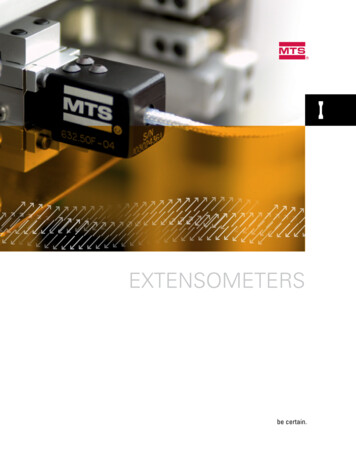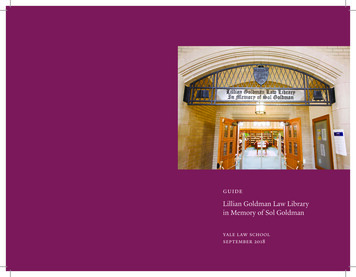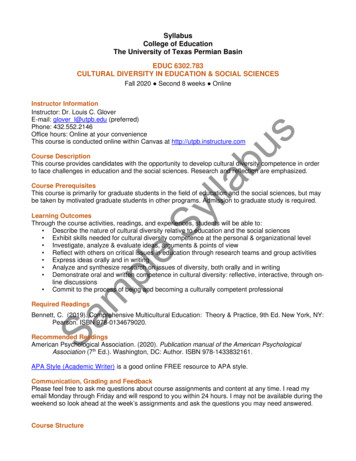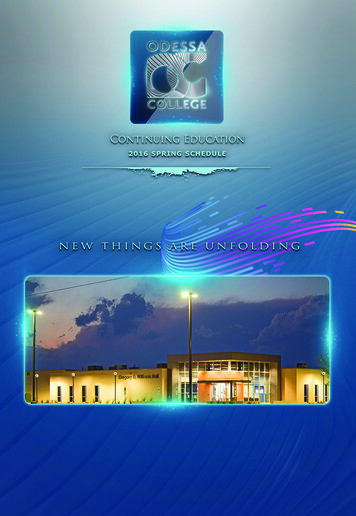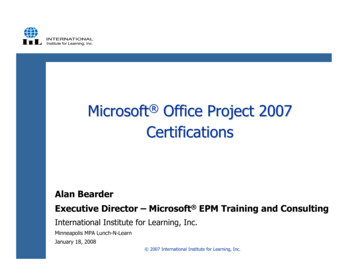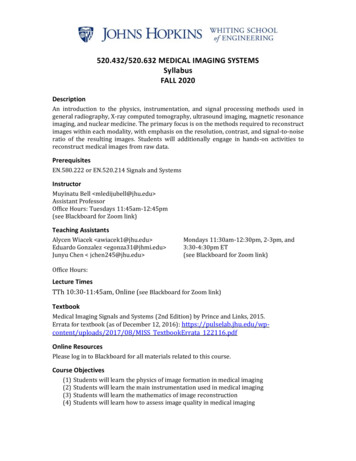
Transcription
520.432/520.632 MEDICAL IMAGING SYSTEMSSyllabusFALL 2020DescriptionAn introduction to the physics, instrumentation, and signal processing methods used ingeneral radiography, X-ray computed tomography, ultrasound imaging, magnetic resonanceimaging, and nuclear medicine. The primary focus is on the methods required to reconstructimages within each modality, with emphasis on the resolution, contrast, and signal-to-noiseratio of the resulting images. Students will additionally engage in hands-on activities toreconstruct medical images from raw data.PrerequisitesEN.580.222 or EN.520.214 Signals and SystemsInstructorMuyinatu Bell mledijubell@jhu.edu Assistant ProfessorOffice Hours: Tuesdays 11:45am-12:45pm(see Blackboard for Zoom link)Teaching AssistantsAlycen Wiacek awiacek1@jhu.edu Eduardo Gonzalez egonza31@jhmi.edu Junyu Chen jchen245@jhu.edu Mondays 11:30am-12:30pm, 2-3pm, and3:30-4:30pm ET(see Blackboard for Zoom link)Office Hours:Lecture TimesTTh 10:30-11:45am, Online (see Blackboard for Zoom link)TextbookMedical Imaging Signals and Systems (2nd Edition) by Prince and Links, 2015.Errata for textbook (as of December 12, 2016): 8/MISS TextbookErrata 122116.pdfOnline ResourcesPlease log in to Blackboard for all materials related to this course.Course Objectives(1)(2)(3)(4)Students will learn the physics of image formation in medical imagingStudents will learn the main instrumentation used in medical imagingStudents will learn the mathematics of image reconstructionStudents will learn how to assess image quality in medical imaging
(5) Students will learn how to model and analyze medical imaging systems using signalsand systems concepts and mathematics(6) Students will learn how to manipulate real medical imaging dataCourse Topics Signal and image processing conceptsImage qualityPhysics of radiographyProjection radiographyComputed tomographyPhysics of nuclear medicineNuclear medicineUltrasound imagingUltrasound physicsNuclear magnetic resonanceMagnetic resonance imagingCourse Expectations & GradingOnline Delivery Details Lectures will be delivered synchronously and recordings made by the instructor willbe available afterward. Attendance during the synchronous lectures is stronglyencouraged and class participation will count toward the final grade. Studentrecording of lectures is not permitted.Students benefit from interaction with each other and are requested to form andreport study teams to the instructor and TAs. If no team is reported by the end ofthe first week of class, study teams for enrolled students will be automaticallyassigned.Homework submissions will be facilitated through Blackboard.Exams will occur synchronously and will be administered through RespondusLockDown Browser and Monitoring Tools.o You will need to download the Respondus LockDown Browser to take ad.php?id 123533816(this is the download link is for JHU Blackboard users). You will be unable toexit the exam until all questions are completed and submitted. When itcomes time to take the exam, enter the Blackboard course site to start theexam. The LockDown browser will start automatically.o Respondus Monitoring records your activities during the exam with awebcamera. You do not have to install additional software beyond theRespondus LockDown Broswer, but you will need to connect a webcamerato the device on which you are taking the exam. The Monitoring tool willrecord you while you take the exam, and the recording will be available forviewing by the instructor afterward afterwards.
Download and install the Respondus LockDown Browser well before yourexam so you can ensure it is installed properly. It is not recommended to ause Google Chromebook device with LockDown browser.o Choose a location where you won't be interrupted to take the exam.o General JHU help page: https://uis.jhu.edu/respondus/If any of the above details are problematic for you or present hardship, pleaseprovide a timely notice to the instructor in writing.o HomeworkHomework problems will be assigned with each new topic, and they are due at thebeginning of class on each indicated due date (see the course schedule for homework duedates). Submissions will be facilitated through Blackboard. No late submissions will beaccepted.ExaminationsThere will be three in-class examinations (see the course schedule for their dates). These inclass exams address the most recent material; thus, they are not cumulative. The final examwill take place in the registrar-scheduled 3-hour exam period during exam week. Exams willbe posted on Blackboard at the start of class, will be timed, and must be submitted beforethe time expires to receive credit. No late exam submissions will be accepted.PresentationsAll students taking the graduate version of this course are required to give a presentation tothe entire class that delves deeper into one of the topics discussed in class. This topic mustbe related to medical imaging, and proposals for the selected topic must be approved byProfessor Bell (see course schedule for proposal due dates). There will be a question andanswer period after each presentation and student performance during both thepresentation and the question and answer period will be evaluated. Undergraduate studentparticipation is particularly encouraged during the question period and this participationwill count toward your final grade.GradingThe final numerical score for the course will be based on the following breakdown:Homework 30%Exams 35%Presentations* 10%Class participation 5%Final 20%*Includes overall presentation, questions asked, and grad student responses to questions
Key DatesDateSubject9/1Introduction to Medical Imaging,Review of Signals & SystemsReview of Fourier TransformsReview of Fourier Transforms (cont.)Image Quality: Contrast, ResolutionImage Quality: Noise, SNR, AccuracyPhysics of RadiographyProjection RadiographyProjection Radiography: Image FormationExam 1Computed Tomography (CT): Equipment,Image FormationCT: Image Formation (cont.), Image QualityPhysics of Nuclear Medicine (NM)NM Planar ScintigraphyNM Planar Scintigraphy: Image Formation,Image QualitySPECT & PET: Image FormationExam 2No Class (Fall Break)Ultrasound (US) Imaging SystemsUS PhysicsUS Steering, Focusing, Beamforming, ImageQualityMagnetic Resonance Imaging (MRI):Instrumentation, Data Acquisition, PhysicsMRI Contrast, Frequency Encoding, PhaseEncodingMRI Pulse Sequences, ImageReconstruction, Image QualityExam 911/2411/2612/112/312/812/1412/22Hands-on Image Formation (Part 1)Grad Student Proposals DueThanksgiving BreakThanksgiving BreakHands-on Image Formation (Part 2)Grad Student PresentationsGrad Student PresentationsFinal Exam (6-9pm)ReadingAssignmentChapters 1,2HW # &Due DateChapter 2Chapter 3Chapter 3Chapter 4Chapter 5Chapter 5#1 – 9/8#2 – 9/15#3 – 9/22Chapter 6Chapter 6Chapter 7Chapter 8Chapter 8#4 – 10/6#5 – 10/13Chapter 9Chapter 11aChapter 10Chapter 11bChapters 13a,12aChapter 12b,13aChapter 13b#6 – 11/5#7 -11/12#8 – 12/3Assignments & ReadingsExpected reading assignments are indicated in the syllabus (see above) and associatedhomework problems will be assigned on Blackboard as we progress through the material.
EthicsThe strength of the university depends on academic and personal integrity. In this course,you must be honest and truthful. Ethical violations include cheating on exams, plagiarism,reuse of assignments, improper use of the Internet and electronic devices, unauthorizedcollaboration, alteration of graded assignments, forgery and falsification, lying, facilitatingacademic dishonesty, and unfair competition.In addition, the specific ethics guidelines for this course are as follows:Homework: You are free to work together to solve the assigned homework problems,however, the work appearing on your submitted homework assignment must be your own.Examinations: Your examination solutions must be your own. The examinations are closedbook and closed notes. However, for the 1st in-class exam, you may bring one 8-1/2” by 11”sheet of paper with any equations or notes handwritten on both sides. For the 2nd in-classexam, you may bring two such equation/note sheets. For the 3rd exam and final exam, youmay bring three such equation/note sheets. PDA’s, computers, tablets, cell phones, pagers,and other electronic aids or storage devices (except for standard calculators) are notallowed to be used during exams. Equation sheets that are used for Exams 1–3 and the finalexam must be handwritten–no photocopied and/or miniaturized text will be permitted.More information: After your formal educational studies, you will be expected to continueto maintain integrity in all that you do in graduate school or in your profession. Manysocieties and professional organizations have their own ethical codes. One worth reading isthe IEEE Code of ethics: 8.html.More information about JHU misconduct policies is available on the university’s website: For undergraduates: t-lifepolicies/ For graduate students: ecificpolicies/Personal Wellbeing If you are sick please notify the instructor by email so that we can make appropriateaccommodations should this affect your ability to attend class, completeassignments, or participate in assessments. The Student Health and WellnessCenter is open and operational for primary care needs. If you would like to speakwith a medical provider, please call 410-516-8270, and staff will determine anappropriate course of action based on your geographic location, presentingsymptoms, and insurance needs. Telemedicine visits are available only to peoplecurrently in Maryland. See also -policy/The Johns Hopkins COVID-19 Call Center (JHCCC), which can be reached at 833-5467546 seven days a week from 7 a.m. to 7 p.m., supports all JHU students, faculty, andstaff experiencing COVID-19 symptoms. Primarily intended for those currentlywithin driving distance of Baltimore, the JHCCC will evaluate your symptoms, ordertesting if needed, and conduct contact investigation for those affiliates who testpositive. More information on the JHCCC and testing is on the coronavirusinformation website.
All students with disabilities who require accommodations for this course shouldcontact me at their earliest convenience to discuss their specific needs. If you have adocumented disability, you must be registered with the JHU Office for StudentDisability Services (385 Garland Hall; 410-516-4720;http://web.jhu.edu/disabilities/) to receive accommodations.Students who are struggling with anxiety, stress, depression or other mental healthrelated concerns, please consider connecting with resources through the JHUCounseling Center. The Counseling Center will be providing services remotely toprotect the health of students, staff, and communities. Please reach out to getconnected and learn about service options based on where you are living this fall at410-516-8278 and online at udent Outreach & Support will be fully operational (virtually) to help supportstudents. Students can self-refer or refer a friend who may need extra support orhelp getting connected to resources. To connect with SOS, pleaseemail deanofstudents@jhu.edu, call 410-516-7857, or students can schedule tomeet with a Case Manager by visiting the Student Outreach & Support website andfollow “Schedule an Appointment”.Classroom ClimateAs your instructor, I am committed to creating a classroom environment that values thediversity of experiences and perspectives that all students bring. Everyone here has theright to be treated with dignity and respect. I believe fostering an inclusive climate isimportant because research and my experience show that students who interact with peerswho are different from themselves learn new things and experience tangible educationaloutcomes. Please join me in creating a welcoming and vibrant classroom climate. Note thatyou should expect to be challenged intellectually by me, the TAs, and your peers, and attimes this may feel uncomfortable. Indeed, it can be helpful to be pushed sometimes inorder to learn and grow. But at no time in this learning process should someone be singledout or treated unequally on the basis of any seen or unseen part of their identity.If you ever have concerns in this course about harassment, discrimination, or any unequaltreatment, or if you seek accommodations or resources, please share them directly with theinstructor or the TAs. Your communication will be taken seriously and mutually acceptableresolutions and accommodations will be sought. Reporting will never impact your coursegrade. You may also share concerns with the department chair, the Assistant Dean forDiversity and Inclusion (Darlene Saporu, dsaporu@jhu.edu), or the Office of InstitutionalEquity (oie@jhu.edu). In handling reports, people will protect your privacy as much aspossible, but faculty and staff are required to officially report information for some cases(e.g. sexual harassment).Family Accommodations PolicyYou are welcome to bring a family member to class on occasional days when yourresponsibilities require it (for example, if emergency child care is unavailable, or for healthneeds of a relative). Please be sensitive to the classroom environment, and if your familymember becomes uncomfortably disruptive, you may leave the classroom and return asneeded.
University Policy on IncompletesThe university recognizes that the Fall 2020 semester is surrounded with uncertainty andmany students may find themselves in unexpected situations where study is difficult if notimpossible. Students who are confronted with extraordinary circumstances that interferewith their ability perform their academic work may request an incomplete grade from theinstructor. Approval of such a request is not automatic, and every effort will be made toaccommodate students dealing with illness in the family and other pandemic-relatedhardships. The instructor will establish a timetable for submitting the unfinished work witha final deadline no later than the end of the third week of the Spring 2021 semester (i.e.,February 12, 2021). Exceptions to this deadline require a petition from the instructor to thestudent's academic advising office by February 12, 2021. When entering an Incompletegrade in SIS, a reversion grade will also be included, representing the grade the student willreceive if s/he does not complete the missing work by the deadline.Deadlines for Adding, Dropping and Withdrawing from CoursesStudents may add a course up to September 11, 2020. They may drop courses up toOctober 12, 2020 provided they remain registered for a minimum of 12 credits. BetweenOctober 12 and November 13, 2020, a student may withdraw from a course with a W ontheir academic record. A record of the course will remain on the academic record with a Wappearing in the grade column to indicate that the student registered and then withdrewfrom the course.For more information on these and other academic policies, emic-policies/grading-policies/ABET Outcomes Ability to identify, formulate, and solve complex engineering problems by applyingprinciples of engineering, science, and mathematics (1)Ability to communicate effectively with a range of audiences (3)Ability to function effectively on a team whose members together provideleadership, create a collaborative and inclusive environment, establish goals, plantasks, and meet objectives (5)Ability to acquire and apply new knowledge as needed, using appropriate learningstrategies data, and use engineering judgment to draw conclusions (7)
520.432/520.632 MEDICAL IMAGING SYSTEMS Syllabus FALL 2020 Description An introduction to the physics, instrumentation, and signal processing methods used in general radiography, X-ray computed tomography, ultrasound imaging, magnetic resonance imaging, and nuclear medicine. The primary focus is on the methods required to reconstruct
